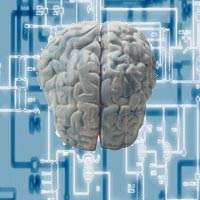Scientists: Biological Clock Is Two-Faced Protein
Mon Jan 6, 3:20 PM ET
http://story.news.ya...cience_clock_dc
WEST LAFAYETTE, Ind. (Reuters) - A two-sided protein that tells cells when to grow and when to rest is nature's timepiece, a discovery that offers help to those whose internal clocks have been disrupted by jet lag or health problems, a husband-and-wife scientific team said Monday.
The two-sided, cylindrical protein, which has been recreated in the laboratory and altered by the team to confirm its function, directs 12-minute growth and rest cycles in living cells, the Purdue University researchers said.
"One 'face' handles cell enlargement. Then the protein 'flips over,' allowing the second face to carry out other activities while cell enlargement rests," said James Morre, a medicinal chemist at Purdue's pharmacy school, who has researched the origins of biological clocks since he was a student 40 years ago.
The protein's precise timing and its links to living organisms' biological clocks was tested by altering cloned versions to produce cycles of between 22 and 42 minutes.
"Now we have an opportunity to tell how organisms tell time," said Dorothy Morre, a professor of foods and nutrition at Purdue University.
"This could give us new insights into cellular activity, such as cholesterol synthesis, respiration, heart rhythms, response to drugs, sleep, alertness -- there's so much," she said.
The body's biological clock, sometimes referred to as Circadian rhythm, has been thought to have hormonal and, ultimately, multiple genetic sources -- though it has been tenuously linked to cycles of the moon and to sunspots. The mechanism seems similar in all organisms, directing plants to unfurl leaves or animals to start a mating cycle.
The couple's research, which was published in the journal Biochemistry, was sponsored in part by NASA (news - web sites), the National Institutes of Health (News - Web Sites) and the Purdue Botanicals Center.
The protein's switching mechanism is difficult to see, because it is constantly moving and has not been crystallized to get a closer look at it, James Morre said.
The prospect of speeding up or slowing down the body's biological clock may not be possible, but it should be possible to reset the clock, he said.
"This discovery also affords an opportunity to improve our methods of clock setting, from minimizing jet lag to correcting sleep disorders," he said. "We might even be able to develop simple artificial clock-setting environments to aid astronauts and those living near the Arctic Circle, where day-night cycles are absent for long periods."



















































